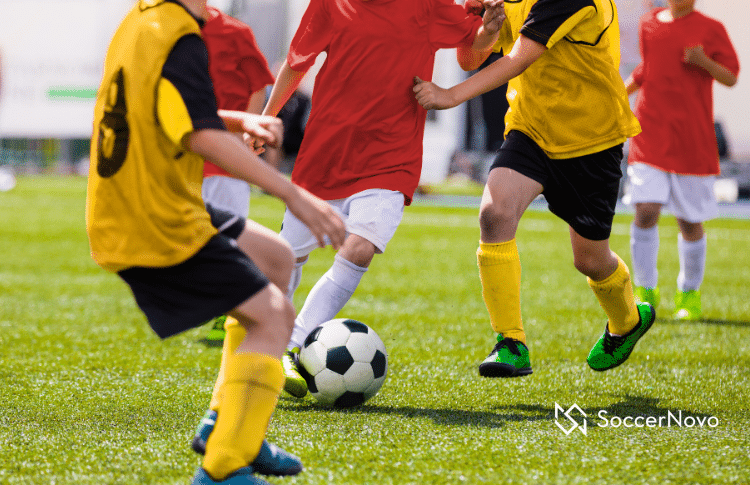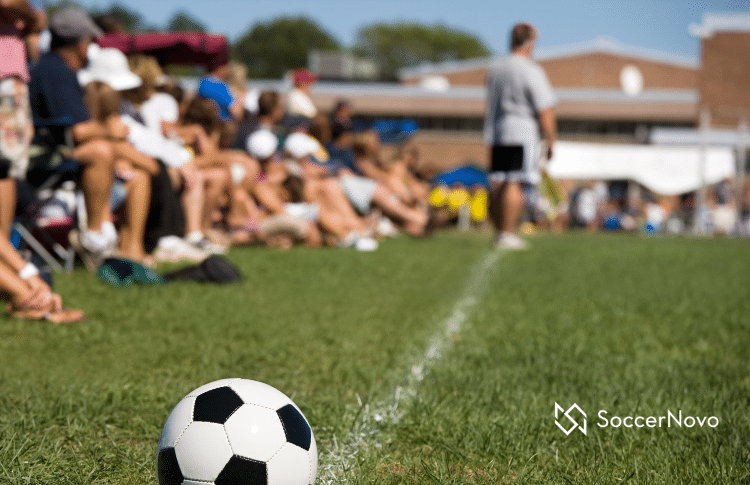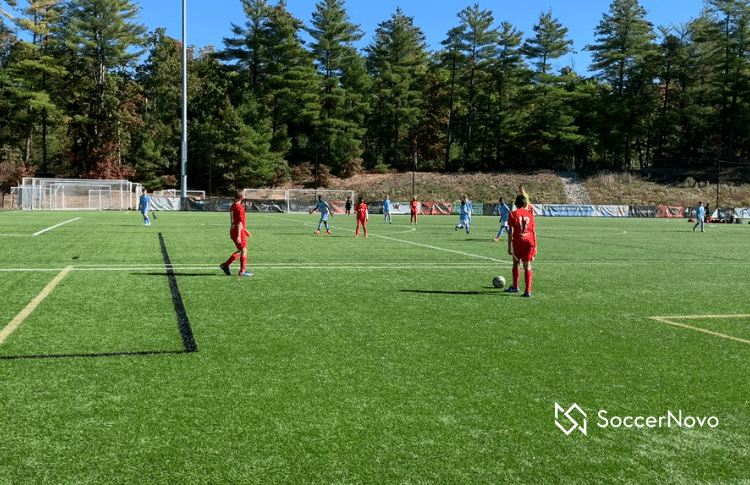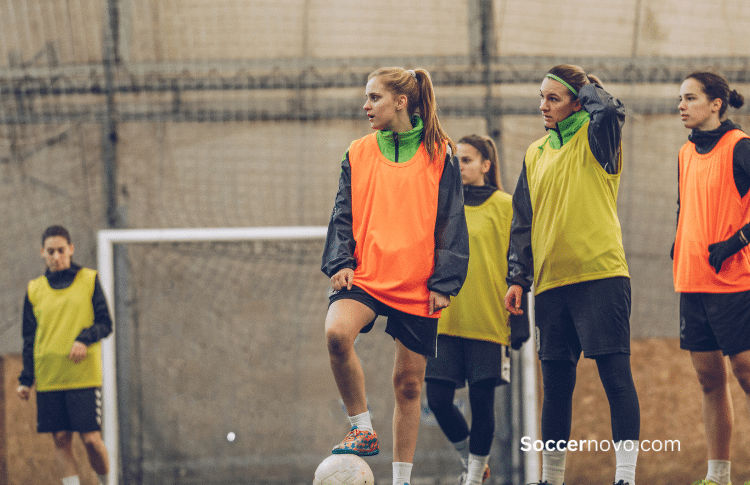How to Prepare for a Soccer Game

Preparing for a soccer game, a test, a presentation, or some other event is important. Going into it without any momentum can sometimes backfire on you. We don’t want this for you so read on!
“Success is where preparation and opportunity meet” – Bobby Unser (3-time Indy 500 Champ)
Preparing for a soccer game doesn’t have to be that complicated. Oftentimes, players make it so.

Whether you’re a beginner or a seasoned player, knowing how to prepare for a soccer game and establishing some habits can help you become a better gameday player.
In this article, we’ll provide you with some tips on how to properly prepare for a soccer game.
Physical Preparation in Soccer
To perform well in a soccer game, you need to be physically prepared. This involves fitness training, proper nutrition and hydration, and adequate rest and recovery. The prep that goes into the physical part of the game starts days, weeks, and months before the game.
Fitness Training
To be in top shape for a soccer game, you need to train regularly, even if it is jogging three times per week.

Exercises such as running, cycling, and swimming, are great for your cardiovascular health. For older players, introducing strength training exercises like squats, lunges, push-ups, situps, and other weight-lifting activities can be very beneficial.
As a player, you should also work on your agility, balance, and coordination, as these skills are essential for soccer.
The key to a good fitness program is to build based on your needs and be consistent with it.
It’s equally important to not overdo it. Rest can be just as beneficial to a soccer player. It’s finding that happy balance that makes all the difference!
Nutrition and Hydration
Proper nutrition and hydration are critical for soccer players. You need to fuel your body with the right nutrients and fluids to perform at your best and avoid injury.
Before a game, eat a meal that is high in complex carbohydrates, such as pasta, rice, or potatoes. These foods will provide you with the energy you need to play at your best. You should also drink plenty of water before, during, and after the game to stay hydrated.
During the game, you can replenish your energy and fluids by consuming sports drinks or energy gels. These products are designed to provide you with the right balance of carbohydrates, electrolytes, and fluids to keep you going.
Rest and Recovery
As mentioned, rest and recovery are just as important as fitness training and nutrition for soccer players. You need to give your body time to rest and repair after a game or training session.
Make sure you get enough sleep each night, as this is when your body does most of its repair work. You should also take rest days during the week to allow your muscles to recover and prevent injury.
In addition to rest, you can also use techniques like stretching, massage, and foam rolling to help your muscles recover more quickly. These techniques can help improve circulation, reduce inflammation, and prevent muscle soreness.
Mental Preparation
I’ve personally seen mentally strong players separate themselves from the rest of the bunch. Even if their skills are lagging a bit, mentally strong players will be ready on game day.
Mental preparation involves getting your mind ready for the game, understanding the game plan, visualizing the game, and managing pre-game excitement or anxiety.
Understanding the Game Plan
Before the game, it is important to understand the game plan and your role in it. This can be achieved by studying the opponent’s tactics, discussing the game plan with your coach and teammates, and knowing your position and responsibilities on the field. When everyone buys into their roles, teams find more success.
Visualization Techniques
Visualization is a powerful mental tool that can help you prepare for the game. Visualize yourself making successful passes, scoring goals, and executing your role in the game plan. This can help build confidence and reduce anxiety.
I know it sounds pretty out there but it does work! When you visualize, you can see potential reality. The imagination often turns into reality when the time comes.
Managing Pre-game Anxiety
It is normal to feel anxious before a game, but it is important to manage it to avoid negative effects on your performance. Some ways to manage pre-game anxiety include deep breathing, positive self-talk, and focusing on the present moment. Remember to stay hydrated, eat well, and get enough rest before the game to help manage anxiety.

By mentally preparing for the game, you can increase your chances of success on the field. Take the time to understand the game plan, use visualization techniques, and manage pre-game anxiety to help you perform at your best!
Technical Preparation
Skills Training
To perform well in a soccer game, you need to have excellent technical skills. You can improve your skills by practicing regularly. But, it doesn’t happen overnight. It takes months and even years to get noticeably better. Here are some skills you should work on:
- Dribbling: Practice dribbling the ball at different speeds and angles. Focus on keeping the ball close to your feet and using both feet equally.
- Passing: Practice passing the ball accurately and with the right amount of force. Work on both short and long passes.
- Shooting: Practice shooting the ball with accuracy and power. Work on shooting with both feet and from different angles.
Team Strategy
In addition to individual skills, it’s important to understand your team’s strategy. This includes knowing your position and your role in the team. Here are some things to keep in mind:
- Position: Understand your position and what is expected of you. Each position has different responsibilities and requires different skills.
- Formation: Understand your team’s formation and how it affects your role. Work on positioning yourself correctly within the formation. Know where your teammates are in the formation so you can communicate more effectively.
- Communication: Communication is key in soccer. Make sure you are communicating with your teammates on the field. This includes calling for the ball, giving directions, and providing constructive feedback.
Game Day Preparation
Packing the Uniform (and Double Checking)
This is a biggie! On game day, it’s important to make sure you have everything you need for the game. The last thing you want is to realize you forgot something important when you’re already at the field. It’s a gut wrenching feeling to look in your bag and notice your shin guards or cleats are missing.
To avoid this, pack your uniform and equipment the night before the game. Double check that you have everything you need, including:
- Jersey
- Shorts
- Socks
- Cleats
- Shin guards
- Water bottle
Pre-game Warmup
Before the game starts, it’s important to warm up properly to prevent injuries and prepare your body for the game. Your warmup should include:
- Light jogging to get your heart rate up
- Stretching to prevent muscle strains
- Drills to practice your skills and get in the right mindset
Make sure to arrive at the field early enough to give yourself plenty of time to warm up. You don’t want to feel rushed or unprepared when the game starts.
The coach will most likely lead the warm ups but you don’t want to be sprinting from the car straight to the field.
Post Game Analysis
After a soccer game, it’s important to casually analyze your performance to identify areas of improvement and celebrate successes. It’s important to not be so hard on yourself…it’s not worth it. Here are some steps to take during your post game analysis:
- Evaluate Your Performance: Take a moment to reflect on your individual performance during the game. Consider your strengths and weaknesses, and think about what you did well and what you could have done better.
- Review Team Performance: Analyze your team’s overall performance. Think about areas where the team excelled and areas where improvement is needed. Consider the team’s strategy, communication, and execution.
- Identify Opportunities for Improvement: Based on your evaluation, identify specific areas where you can improve your performance. Consider skills you need to work on, areas where you need to improve your fitness, and strategies you can use to be more effective on the field.
- Celebrate Successes: Don’t forget to celebrate successes, both individual and team. Recognize good plays, goals scored, and other accomplishments.
- Plan for the Future: Use your post game analysis to plan for upcoming games. Consider what you need to work on in practice, and how you can improve your performance in the next game.
By taking the time to analyze your performance after a soccer game, you can identify areas of improvement and celebrate successes. Use this information to improve your skills and become a better player.
Conclusion
By following the steps outlined in this article, you can effectively prepare for a soccer game and give yourself the best chance of success. Remember to start your preparation early, both in terms of physical training and mental preparation.
Make sure to fuel your body with the right nutrients and hydrate properly before the game. It’s also important to pack all the necessary gear and equipment, including your uniform, shoes, shin guards, and ball.
During warm-up, focus on dynamic stretching and exercises that mimic the movements you’ll be making during the game. Use this time to mentally prepare yourself for the upcoming game.
And, the most important point of them all, remember that it’s just a game! And, there will be plenty more of them. So, if you feel like you didn’t do well, just use it as a learning experience for next time.
Frequently Asked Questions
What should I eat before a soccer game?
What are some effective mental strategies for soccer game preparation?
What gear should I bring to a soccer game?
What is the best way to hydrate before a soccer game?

Written By: SoccerNovo
SoccerNovo is an independent youth soccer media brand built to help parents, players, and coaches better understand the game and the pathways available in U.S. soccer. Our mission is to make youth soccer simpler, clearer, and more accessible for everyone involved in it.
Let’s connect






